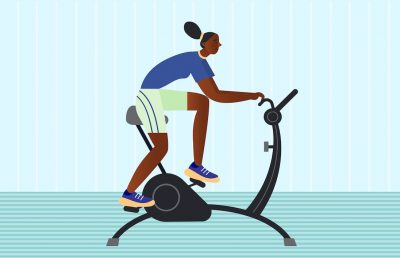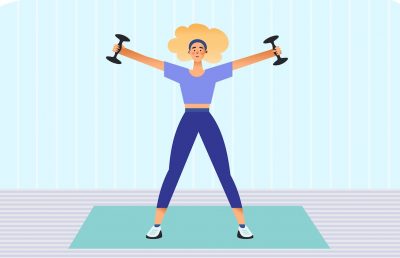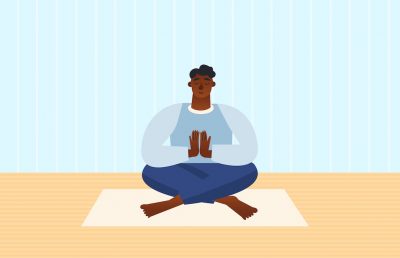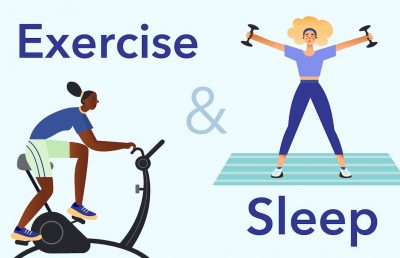Table of Contents
The solution to a more restful night? Movement, experts say.
It seems the answer to so many physical and mental health woes have just one thing in common — exercise. Sleep is no exception. If you are looking for longer sleep, higher-quality sleep, or fewer interruptions from sleep apnea, insomnia, and other ailments, the type of movement you do during the day might hold the secret to nighttime success. Here’s what the experts, and the latest research, is revealing about the connection between sleep and exercise.
How does exercise affect sleep?
Scientists are still exploring exactly why movement and sleep are connected. Dr. Alex McDonald MD, CAQSM, board-certified family physician, says, “We don’t exactly know how exercise improves sleep quality, but it does seem to increase the slow wave sleep cycle, which is the deep restful sleep and often where the body and mind best rejuvenate. Furthermore, exercise likely helps reduce anxiety and daily stress to help the mind shut off at night and recover cognitively as well.”
Exercise might also simply help your mind decompress, allowing you to transition more easily into sleep, according to Dr. Stacy Sims, nutrition scientist and exercise physiologist. “It also reduces the time it takes to fall asleep and can reduce the amount of time people lie awake at night,” she explains.
What is the best time of day to exercise for sleep?
While scientists have mostly agreed that you need around 30 minutes of “moderate aerobic” exercise for optimal sleep, they have some varying opinions on how important the time of day is. Sims says, “Timing can be an issue for some people due to the endorphins released — it can make the brain more active for a couple of hours and increase the core temperature.”
Sims says those training within two hours of bedtime might have to reduce their core temperature themselves by:
- Drinking a semi-frozen drink
- Eating ice cold, low sugar foods
- Considering a cold water immersion (such as an ice bath)
Even though it doesn’t sound like the coziest wind-down routine, it regulates your body temperature and reduces inflammation, she explains.
Morning or afternoon exercise is optimal (especially if you aren’t planning any ice baths) to ensure your blood stops pumping so hard well before bedtime. “Everyone is different, but I recommend patients avoid exercise late in the afternoon or evening, as this can be more activating and can have potentially negative sleep benefits. Consistency is key,” McDonald says, adding that overexercising can also cause short-term negative sleep impacts as well.
However, some studies have shown that exercising late didn’t actually make sleep any worse, leaving it up to an individual to determine their reaction.
How much exercise do you need for better sleep?
Not everyone will see benefits from adding those 30 minutes of exercise because results vary based on your current abilities and level of physical fitness. Dr. Luis Javier Peña-Hernández, a lung health specialist at PCSI, says, “The intensity of exercise and length of time per workout varies depending on each individual’s fitness level; however, by getting at least 30 minutes of exercise, you should be able to see an improvement in your sleep quality that same night.”
Thirty minutes most days per week adds up to 150 minutes per week, the recommended amount for not only sleep benefits but numerous additional perks like lowering your risk of multiple diseases and even lowering the risk of premature death, studies show.
Family physician Dr. LaTasha Perkins has personally seen regular exercise improve her own sleep. “I find that my sleep is more restful, and I spend more time in REM sleep. Exercising relieves some stress and lets me think about something else for a while. As a physician and mother, I really value my sleep, so I want to make sure it’s restful,” she says.
Sleep and exercise facts
Though researchers don’t fully understand the “why” behind the relationship between movement and sleep, they do know quite a bit about the benefits. Here are a few facts to motivate you to move more for improved nights.
- In just 12 weeks, older adults who exercised logged fewer abnormal breaths in an hour (“respiratory events”), which shows potential benefits for people who have sleep apnea and other breathing issues complicating sleep, one study revealed.
- Older adults who walked more than once per day, with a total walking time of more than 210 minutes per week reported “good sleep quality.”
- Hopkins Medicine reports that you get immediate sleep benefits from exercise — as soon as the same night, which can be a relief as sometimes other exercise benefits take longer to manifest, such as improved muscle tone or weight loss.
- Exercise can give you a “natural high,” which you may have heard of in the form of a “runner’s high” that produces a “chemical payoff” from exercise, which can help with overall well-being and therefore sleep, according to Dr. Patrick Porter, neuroscience expert and founder of BrainTap.
How cardio affects sleep

While a brisk walk or jog might feel great for your body, it can also wear you out in the best way, leading to deeper and longer sleep at night. But ironically, aerobic exercise decreases overall fatigue as well, one study shows. However, how hard you engage in cardio exercise matters, as that study showed no improved sleep for mild intensity. But for those who had “intensified” aerobic activity over 8 weeks, it positively influenced “all components of sleep quality.” Our experts recommend choosing exercise you enjoy so you stay interested in the long term. Some of those potentially more taxing cardio options include:
- Brisk walking or running
- Swimming*
- Cycling
- Playing tennis or other aerobic sports
- Jumping rope
*A note about swimming: While multiple cardio options are available, those with joint issues or those who are looking to reduce pain or stress levels might especially consider the benefits of swimming. In one study of Multiple Sclerosis sufferers, swimming significantly reduced pain.
Sims adds that it’s an “ongoing myth” that too high-intensity cardio workouts “amp up” people too much to get better sleep.
How weight lifting affects sleep

It might not be obvious to see the connection between lifting weights and getting longer sleep durations, but a recent American Health Association study made waves for determining just that in March 2022. Multiple groups of participants exercised 180 minutes per week (except the no-exercise control group), but some had only aerobic training, some had resistance training, and some had a combination of the two. The study concluded that resistance training mattered most — that group, of which 42 percent hadn’t been getting at least 7 hours of sleep at the beginning of the study — saw a 40-minute improvement in sleep duration after one year. The combination group only had 17 minutes more, and the aerobic exercise group had 23 minutes more. This means that those who do weight training saw almost double the number of extra sleep minutes than the aerobic group.
Sims says that more intense workouts often lead to more of a push to sleep for recovery at night, which could explain the link between weightlifting and sleep improvements. Researchers recommended after the study that those who are struggling with sleep incorporate two or more resistance exercise training sessions into your regular exercise routine, “to improve your general muscle and bone health, as well as your sleep.”
How yoga affects sleep

Yoga has long been associated with improved mind-body connection, well-stretched muscles, and overall wellness. But yogis might not realize just how much their routine is helping their sleep, and those who haven’t tried it can benefit as well. Perkins says that 20-60 minutes of yoga, depending on the intensity, is enough to help sleep. “The important things to focus on are the intensity and duration of the exercise,” she says.
Even just working in one weekly yoga session might help — one study of pregnant women who did yoga just 20 minutes per week over 12 weeks reported fewer sleep disturbances and lower anxiety.
Sims explains that different types of yoga have varying impacts:
- Yin yoga, a slow-paced version of the popular practice focused on deep stretches, helps by increasing activity in the parasympathetic nervous system, which controls our “rest and digest” functions.
- Vigorous types of yoga help with sleep as well
- Breath work associated with yoga induces more parasympathetic activation, improving sleep by increasing slow wave sleep (the most restorative sleep stage)
- The benefits of yoga are most helpful if yoga is being practiced three hours prior to bedtime like other types of exercise
Tips for incorporating exercise into your sleep routine
If you’re convinced sleep might be the answer to your sleep woes, these tips can help you get started, avoid injury, and enjoy yourself along the way.
Take it slow
If you haven’t exercised before, going from zero to 100 in one day isn’t the best plan, and can lead to too much soreness and more sleep disturbances rather than improvements. Instead, work up to 30 minutes most days per week. McDonald says having some fun with the activity should be your guide, above all else. “Pick an exercise routine which is consistent, enjoyable, and stick to it 5 to 6 days a week.”
Talk to your doctor first
Especially if you have a history of health conditions or old injuries, consulting with your physician first can lead to consistency and success. Perkins says, “Your family physician can help you work through any concerns you may have in regards to your exercise and sleep, as they are aware of your health history and can help make decisions based on what makes the most sense for you personally.”
Vary your routine
You don’t have to do the same thing every day to see success. Instead, choose a variety of workouts you enjoy so you don’t get bored. You can also break up the 30 minutes per day into 10 minute increments, as long as you are reaching high enough heart rates during those times to experience moderate to intense levels of exercise.
The Last Word from Sleepopolis
There are so many reasons to start moving. For those with persistent sleep issues, you might be pleasantly surprised with just how quickly 30 minutes per day can resolve sleep challenges that have gone on for years. Give it a try and enjoy the many potential benefits exercise brings to sleep and health overall.
Subscribe Today!
Get the latest deals, discounts, reviews, and giveaways!

